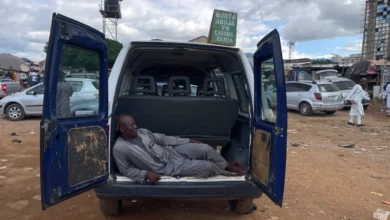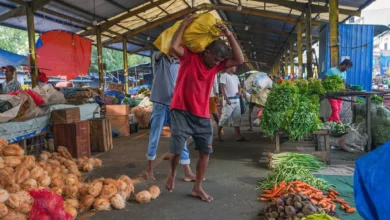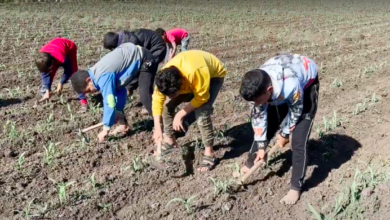For some Tahrir Square protesters, the square itself has become a mini-country, self-sufficient and cut off from the state, a communal utopia of resistance and endurance.
Every country, though, has its misfits, physically present but invisible, a part of and apart from their societies due to poverty, or illiteracy, or simply because they are different. Tahrir is no exception, and in this society it is the street vendors who are fighting their own battle.
Street vendors have been repeatedly accused of starting trouble in the square over the past year. On 9 March, they allegedly broke up the sit-in forcibly, in collusion with military soldiers and other civilians. And just a few days before the 8 July sit-in, eyewitnesses said that some street vendors, following an argument, attacked protesters by using a camping stove to set a tent on fire.
They were readmitted, though, and that Thursday had already resumed their posts in various parts of the square, selling tea, juice, snacks and revolution souvenirs.
On Thursday, near the entrance to Talat Harb Street in Tahrir Square, Ramadan Ali from Abdeen was selling tea. He explained that he has been in the square “since the beginning” and is trying to make enough money to support his four daughters, a break from his usual job as a porter in the nearby Bustan Computer Mall, where he earns between LE30 – 40 per day.
Next to him was Akram Suleiman, originally from Beheira but now based in Cairo, who sells couscous. Suleiman had previously worked for twelve years on contract as a solderer with the Petrojet Company. However, the company was able to dispense with his services easily, as he had never been made a permanent employee, and he found himself unemployed. Unable to find work elsewhere, he took to the streets.
"People say vendors are thugs but has anyone ever tried to help us, to lift us out of [the situation] we’re in? I wish street vendors didn’t exist – that we were given a dedicated location to work at,” Suleiman said.
Suleiman and other vendors described ritual humiliation at the hands of police patrols outside the square: “No one could talk to them. They were like pharaohs,” he related.
Officers would help themselves to goods or verbally abuse the vendors. Vendors unable to pay bribes would disappear for a few days at police stations.
On Wednesday morning this week, vendors were subjected to something similar; they were ejected en masse from the square. Various accounts were given as to why this decision was taken; most attributed it to the vendors “starting trouble”.
Protester Mohamed Wasfy, a 21-year-old student of economics at Cairo University, said that the decision was taken “because the media were saying that the vendors are thugs; they use them in order to badmouth the revolutionaries.”
The decision to exclude the vendors followed an altercation on Tuesday at one of the square’s checkpoints. Eyewitnesses said that a vendor, objecting to his treatment by the individuals manning the checkpoint, returned with a group of other vendors to attack the sentries.
Several protesters condemned the mass expulsion, but pointed out that checkpoints are undermanned and work under the constant threat of violence. They also said that the vendors’ camping stoves pose fire risks, given the number of tents in the area, and that some vendors sell drugs and harass female protesters.
"There is good and bad among the vendors, just like there is good and bad among the protesters,” reasoned vendor Ahmed Mohamed.
He and his brother, Abdel-Aal Mohamed, who are from Assiut, sell cold drinks at the Qasr al-Nil entrance to Tahrir. They say that their area of the square is full of other vendors from Assiut.
Ahmed Mohamed was scornful of suggestions that vendors are all “thugs” – that nebulous term increasingly bandied about in the media to refer to civilians paid by the state to attack protesters – or ordinary criminals.
"Why would I come all the way from Assiut to work as a thug? And if I really was a thug would I be stuck here selling drinks?” Ahmed Mohamed continued.
Suleiman said that there are qualified and skilled members in the vendors’ ranks, and that it is a lack of job opportunities rather than a lack of ability that has forced them into their line of work.
Despite these explanations, the general image of the vendors remains negative. Many of them are young and loud, and frequently argue amongst themselves over territory. Several female vendors smoke openly, which is unusual in Egyptian society. All of this leads to whispered aspersions that the vendors are uncouth, and that they make the square “look bad”.
Protester Sherif Anbar said that the vendors' presence dotted around the square makes it look like a “street market”.
Another protester, Noor Ayman, suggested that there is a “classist” element to the antagonism toward the vendors. “[The media] are put off when they come into the square and see all these people who aren’t like them,” he alleged.
A tea vendor from Kafr al-Sheikh, who went by “Mohamed,” agreed. “They think the vendors are a blot on the square,” he said.
The vendor-protester schism is marked, despite the fact that many of the vendors say they are there for the same reason that the protesters are.
As Abdel-Aal Mohamed discussed his feelings of hopelessness after the revolution, a bystander took offense at what he was saying and interrupted him.
"He didn’t realize I was a seller because I was talking to you,” Abdel-Aal Mohamed said. “Sometimes they way [the protesters] talk to us makes us feel like we’re not Egyptians.”
"Why are all these people here – I’m here for the same reason,” Abdel-Aal Mohamed continued. “My national pride isn’t less than theirs.”
Tea vendor Mohamed said that the rift lies in the differences in capability. “The protesters have people to spend money on them and we don’t. If I had someone to support my family and me I would be the first person in a tent in the square. But I don’t. I have to make a living.”
Mohamed, who earns roughly LE50 per day, said that there was little difference between Tahrir and wider society.
"We can’t find enough money to live on inside or outside the square,” he lamented. “We just want the world to have mercy on those that have never experienced it, to notice us, the living dead in the streets.”




